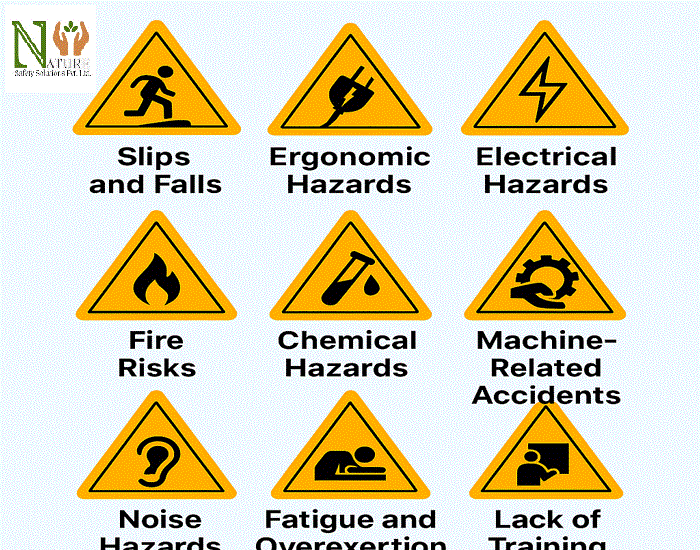Every workplace, whether industrial or office-based, carries its own set of safety risks. While some hazards are obvious, others may go unnoticed until an incident occurs. Being proactive about identifying and addressing these risks is essential for protecting workers, maintaining productivity, and ensuring legal compliance. This article highlights the top 10 safety hazards commonly found in workplaces and offers practical tips to help prevent them.

1. Slips, Trips, and Falls
These are among the most common causes of injury. Wet floors, uneven surfaces, and cluttered walkways pose risks.
Prevention: Use non-slip mats, place caution signs, and keep walking paths clear.
2. Ergonomic Injuries
Poor posture, repetitive tasks, and improperly designed workstations can cause musculoskeletal disorders.
Prevention: Provide ergonomic furniture, train employees on proper posture, and encourage stretching.
Read also : Silent Strain: Understanding and Preventing Ergonomic Injuries at Work
3. Electrical Hazards
Exposed wires, damaged cords, and overloaded outlets can lead to shocks, burns, or fires.
Prevention: Conduct regular inspections and only allow trained personnel to manage electrical systems.
4. Fire Risks
Improper storage of flammable materials or faulty wiring can lead to fires.
Prevention: Store chemicals safely, maintain equipment, and keep fire exits unblocked.
Read also:-Workplace Fire Prevention: Protecting People, Property, and Productivity
5. Chemical Exposure
Improper handling of hazardous substances can cause burns, poisoning, or respiratory issues.
Prevention: Provide appropriate PPE and train employees in safe handling procedures.
6. Machine-Related Accidents
Inadequate machine guarding or lack of operator training often results in serious injuries.
Prevention: Install safety guards and ensure proper training for machine operators.
7. Noise Hazards
Extended exposure to loud environments can cause hearing loss.
Prevention: Provide hearing protection and rotate tasks to reduce exposure time.
8. Fatigue and Overexertion
Long working hours and physical strain can reduce focus and lead to accidents.
Prevention: Promote work-life balance, schedule regular breaks, and encourage task rotation.
9. Workplace Violence
Conflicts or aggressive behavior between coworkers may pose safety risks.
Prevention: Foster a respectful culture and offer training in conflict resolution.
10. Lack of Training
Untrained employees are more likely to make mistakes that cause injury.
Prevention: Provide regular safety training and refreshers for all staff.
Read also:-
- Walking the Safe Path: Strategies to Prevent Slips, Trips, and Falls
- Electrical Safety in the Workplace: Awareness, Action, and Prevention
- Electric Safety at Work: A Guide for Employees and Employers
- Green Barriers: Nature’s Shield Against Pollution
- E-Waste and Environmental Safety: A Ticking Time Bomb
- The Silent Threat: How Air Pollution Affects Human Health
